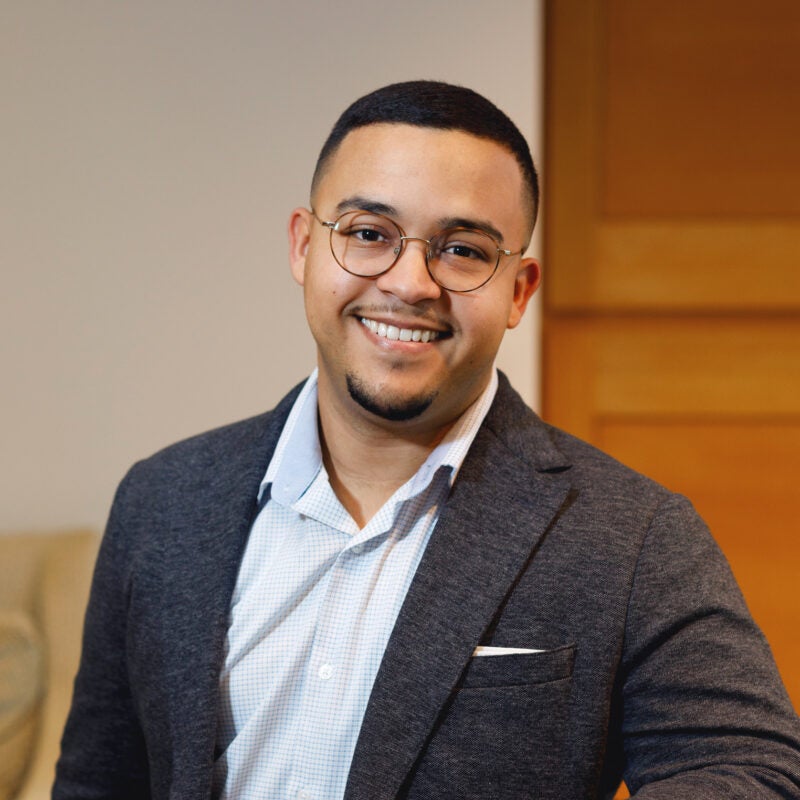This is one in a series of profiles of 2023 Cravath International Fellows.
Carlos Gonzalez Sierra ’23, a 2023 Cravath International Fellow, has a longstanding commitment to working on immigrant rights, and in trying to understand the factors that force people to emigrate. His interest is both academic and personal. Gonzalez Sierra is pursuing a joint degree in law and public policy from Harvard Law School and the Harvard Kennedy School. He is also an immigrant himself. His family left the Dominican Republic for economic reasons when he was a child, and because the family’s visas expired, he grew up undocumented. Although he is now protected by DACA, “that experience is still very present,” he explains.
Most of the current discussion on immigration “focuses on the moral responsibility and legal obligations of the United States to accept and welcome those fleeing from violence in Central America. But while a more welcoming U.S. policy should be part of the discussion, Central American civil society and governments also have a role to play in improving the internal conditions that push their citizens north,” he observes. “I hoped to learn from those on the ground what support they need from the U.S. government and other organizations. This knowledge would make me a more effective advocate for immigrant rights within the United States.”
This second question led Gonzalez Sierra to undertake a winter term independent clinical with Cristosal, an NGO working in the northern triangle of Central America. Among its programs, Cristosal provides legal aid and psychological support to victims of forced displacement. In El Salvador, he explains, internal displacement is primarily driven by gang violence. Other drivers include natural disasters and violence against people because of their gender expression.
Gonzalez Sierra worked with the NGO’s strategic litigation team, which tries to identify victims who could provide a strong case for an amparo. In El Salvador’s constitution framework, this term refers to a protective order allowing the constitutional chamber of the Supreme Court to mandate that state agencies or branches of government provide services for specific victims or enact more structural or policy-driven changes. “It’s a last resort, but it’s also a tremendous power for a court to be able to mandate that other branches of government do certain things, like enact a new law or develop new policies or programs,” he notes. If the government actor is negligent, or refuses to make suitable progress, the court has the power to recommend that the attorney general bring criminal charges.
In El Salvador’s current political climate, “whether or not that happens is another question,” Gonzalez Sierra observes. “Government institutions must implement the terms of an amparo for the ruling to lead to concrete improvements in the lives of petitioners, and the court needs a sympathetic attorney general to enforce its rulings.” Recently, several judges in the constitutional chamber and the attorney general were replaced with appointees sympathetic to President Nayib Bukele or affiliated with his political party, so there are some questions about the continued independence of these institutions and what that means for democracy and the rule of law.
In 2017, Cristosal sued various government institutions on behalf of eight families who fled their homes after gang members and police officers perpetrated violent acts against them. The resulting amparo expanded remedies for victims of forced displacement, including a new law requiring the government to provide them with emergency health services, temporary shelter, education services, and protection, among other benefits. In the two years since its enactment, however, “people continue to be displaced by violence, and the state continues to fail to provide them with the protections guaranteed by law,” he says.
“My research elucidated how politics often undermines the rule of law in El Salvador.”
Carlos Gonzalez Sierra ’23
During his clinical, Gonzalez Sierra conducted research to help determine whether Cristosal should petition for a progress hearing on the government’s compliance with the terms of the amparo, and on the broader question of whether the court is likely to approve and enforce future requests for amparo rulings. His review of the political climate and of recent and likely unconstitutional actions by the government suggest that it is improbable that the court or the attorney general will take any actions against the government, he concludes. “My research elucidated how politics often undermines the rule of law in El Salvador.”
The new law specifically excludes victims displaced by natural disasters, so Gonzalez Sierra also examined the extent of the problem in El Salvador and worldwide, and identified international laws or initiatives designed to protect climate refugees, in order to help shape Cristosal’s advocacy strategy moving forward.
Want to stay up to date with Harvard Law Today? Sign up for our weekly newsletter.
